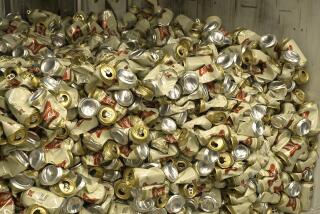Dijon Mustard Makers in a Jam Over Seeds
DIJON, France — The town that put mustard on the map is confronting a foreign invasion: Nearly all the seeds that go into the famous spread are imported from Canada.
France’s top three condiment producers and the Agriculture Ministry have taken to the barricades to resist this assault on culinary patrimony.
It is more than faith in the mustard seed that drives these companies. At stake is the prospect of a regional label, or appellation, for “Dijon mustard from Burgundy,” an official French name recognition that brings with it a range of trade protections.
But one of the biggest obstacles the mustard makers face in trying to reintroduce cultivation of the spice is money--farmers can now make more money growing something else.
Colza, a less spicy cousin used for cooking oil, replaced mustard in agricultural production more than 20 years ago, encouraged by French and European Union subsidies.
But since 1991, the condiment consortium, the French government and regional collectives have contributed more than 9 million francs, or nearly $2 million, for research into high-yield mustard plants that will once again make mustard a viable crop in Burgundy.
And privately, Amora, Maille and European--the Big Three of condiments--are financing mustard test projects with farmers in the southeastern region of France also legendary for its wine.
Help would also come with an “appellation controllee” designation giving them exclusive use of the label in France, if producers can persuade authorities that they qualify.
According to Alain Berger, director of the National Institute of Appellations of Origin, it ensures that regions producing France’s traditional gourmet products will be able to survive in a marketplace that tends to favor price over savor.
“By seeking to enhance the value of the regional product, too often sacrificed to a logic of competition regardless of their unique potential, the controlled appellation of origin is a strong tool for developing a region,” Berger said.
But producers will have to cultivate enough mustard to work with. To date, only 35 farmers have planted test plots totaling about 600 acres. Agriculture officials and the condiment consortium have set a goal of about 12,500 acres in production by 2000. That would cover just under a third of France’s annual demand.
Officials at Amora, as well as Arnaud Ribeyron-Montmartin, secretary general of the Federation of Condiment Industries, and Bernard Chevalier, president of the Chamber of Agriculture in Dijon, all declined to be interviewed.
The French government is in something of a quandary. A spokesman for the Ministry of Agriculture acknowledged the state is wary of ruffling trade relations with Canada, which now supplies more than 95% of the 25,000 tons of seed used every year in French mustard production.
Leaders there may not like the idea of special subsidies and trade protections for Burgundy mustard, Michel Chazot, grain specialist at the ministry, acknowledged to the French financial weekly Le Revenu Francais.
“They could register a complaint before the World Trade Organization for unfair competition,” Chazot said.
Internal politics are no less complicated. To win special recognition from the National Institute of Appellations of Origin, producers have to show that their gourmet product has cultural and historical connections to a particular region of France. That means hearings at the local, regional and federal levels that take about two years.
The institute now guards the regional authenticity of food and drink such as Champagne, Roquefort cheese, Beaujolais wine and Chalonnais beef. The appellation works something like a registered trademark. For example, four years ago a French perfume designer was forced to pull his new creation off the shelves because he had dared to call it “Champagne.”
While Dijon mustard, made with white wine, was first produced for the Grand Dukes of Burgundy in this city around 1630, the name now refers only to the recipe. That means Dijon mustard can be produced in Brittany, Bulgaria or Boston and still carry the city’s name.
More to Read
Eat your way across L.A.
Get our weekly Tasting Notes newsletter for reviews, news and more.
You may occasionally receive promotional content from the Los Angeles Times.







